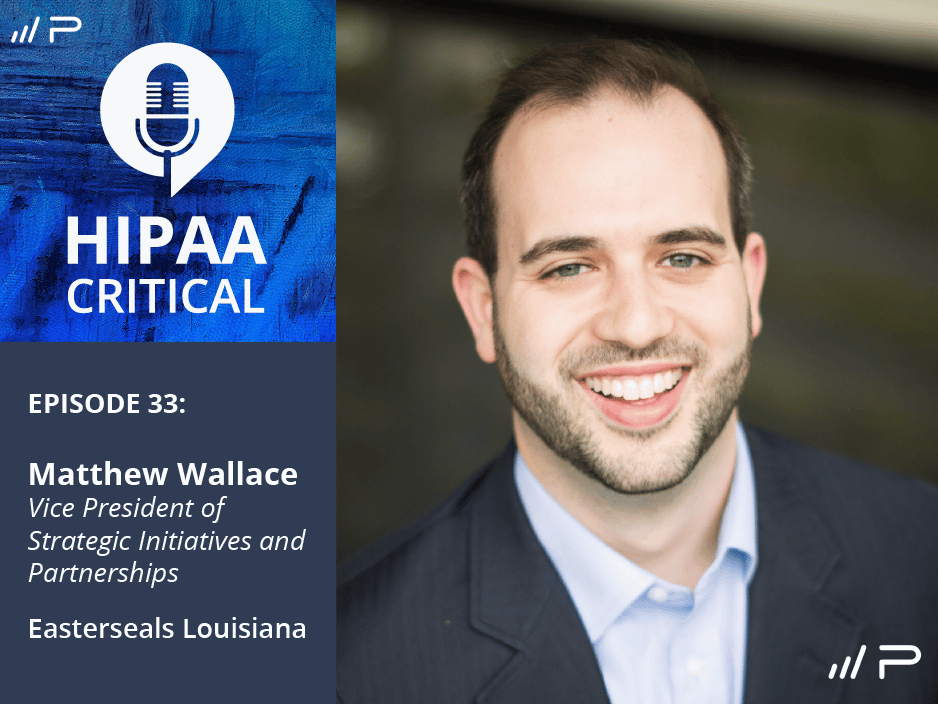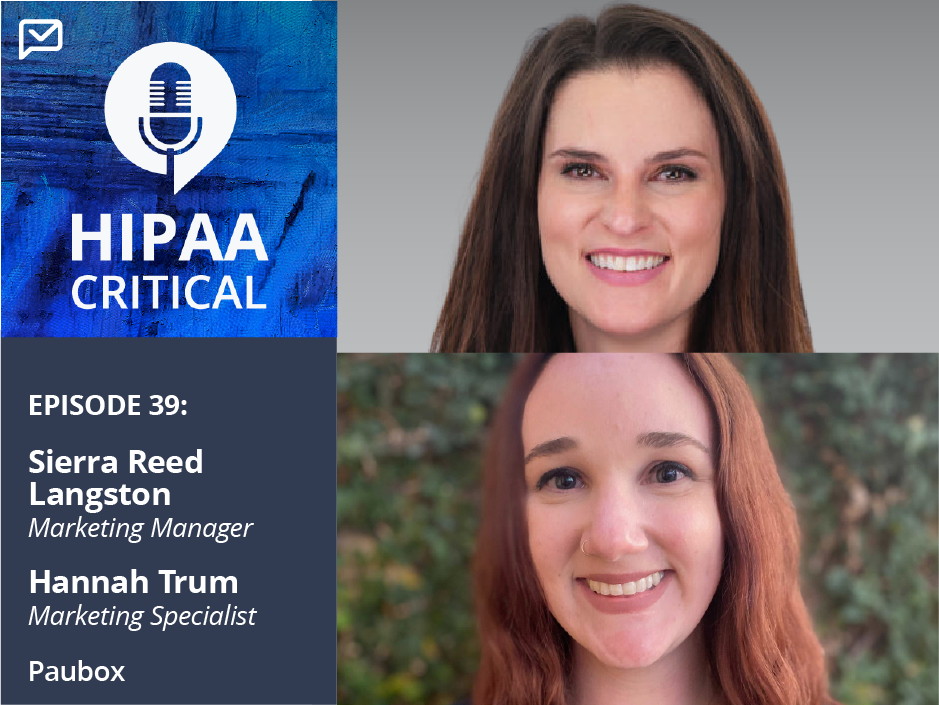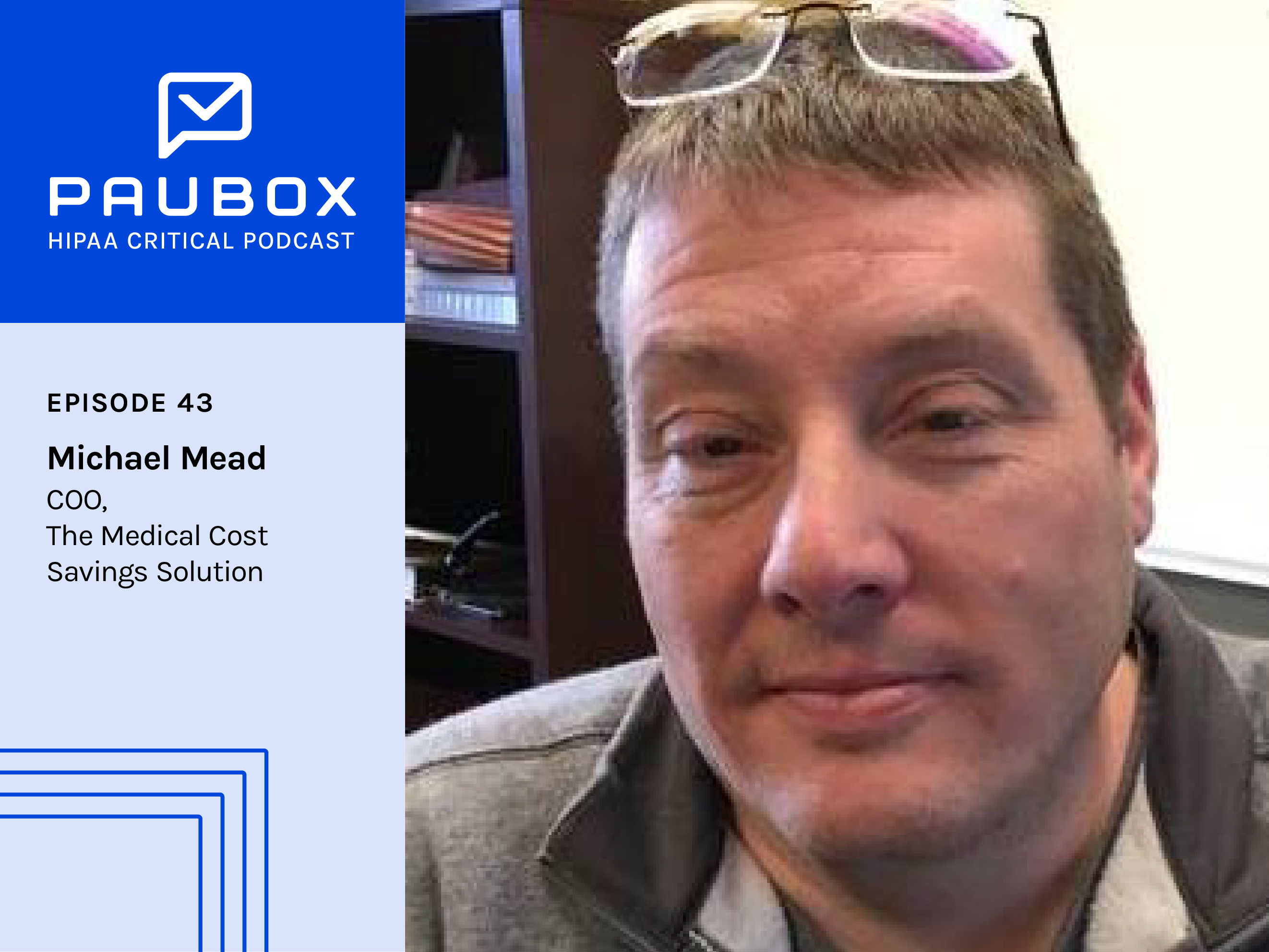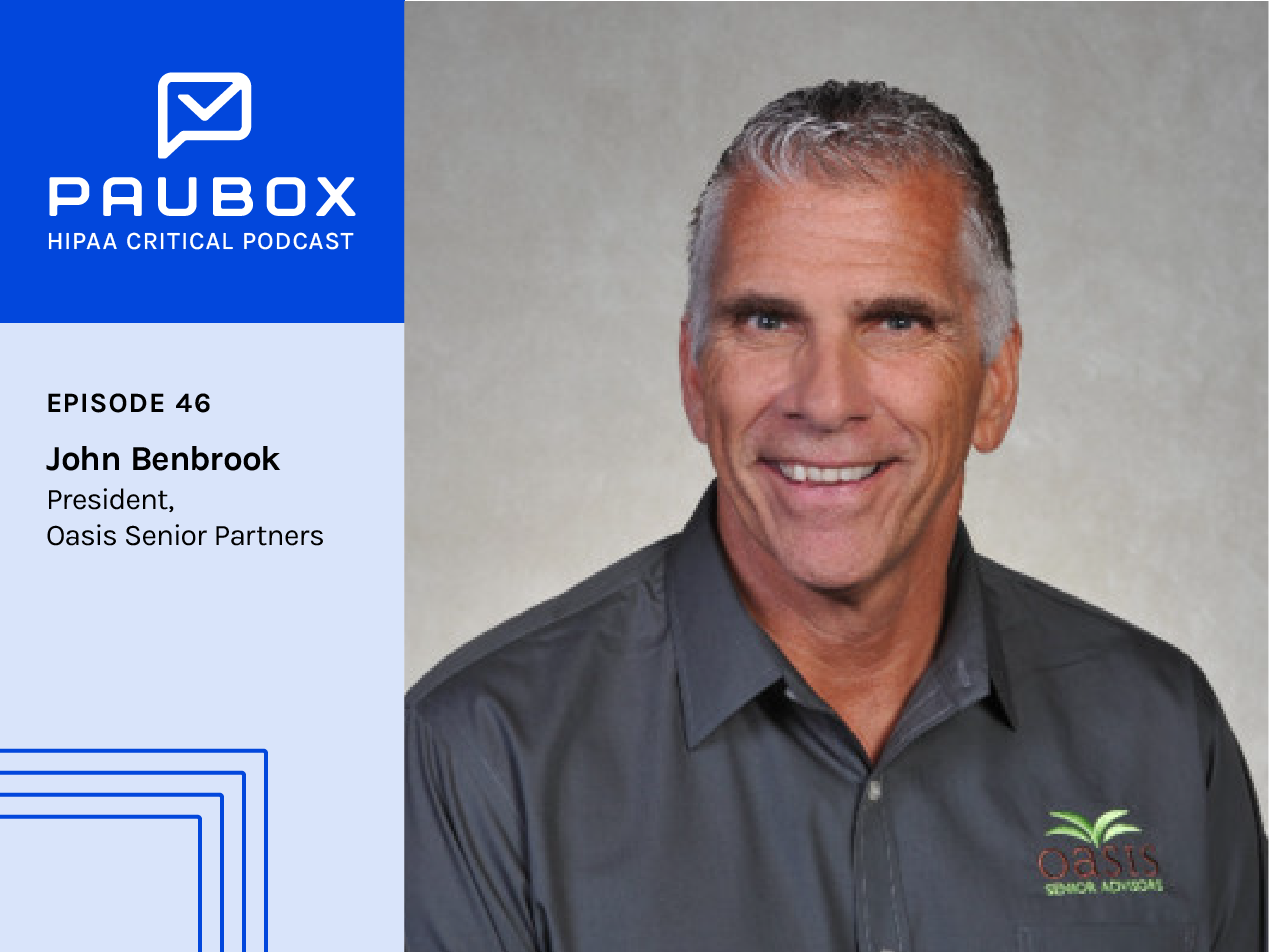7 min read
33. Matthew Wallace: “COVID-19 brought an overnight change to our organization”
Hannah Trum Jan 20, 2021 12:00:00 AM

Have you ever wondered how other businesses and practices are overcoming the challenges of maintaining HIPAA compliance? Well, in this episode, that is what you’ll find out. Amongst the slew of HIPAA violations such as lack of employee training, medical record mishandling, hacking and malware, improper disposal of PHI, lies one HIPAA violation that we will be discussing in great detail, using nonsecure technology to share PHI. Matthew Wallace, vice president of strategic initiatives and partnerships at Easterseals Louisiana, will fill us in on how they can maintain HIPAA compliance and what they have changed within their business because of COVID.
Rather read?
Matthew Wallace: Thanks! I'm so excited to be joining you all.
Sierra: Matthew, can you provide some background on Easterseals Louisiana? Who you guys are, where you're located, and who you all serve? I think that would be a great starting point.Matthew: Easterseals Louisiana is part of the national Easterseals network founded over 100 years ago in 1919 by Edgar Allen. We've operated in Louisiana since 1951. The focus of our mission is to assist individuals with disabilities to achieve independence.
Currently, we have nearly 200 employees across the state, supporting almost 10,000 individuals annually. We do that through our nine separate service sites. Some of our primary supports include case management for individuals with a developmental or age-related disability, early intervention services, and a host of behavioral health programs. Some of those include transitional housing, peer support, and reentry case management.
Sierra: Thanks so much for explaining a little bit more about the company. Can you provide additional background on yourself and your focus?Matthew: I came to Easterseals Louisiana over two years ago, in January of 2019. Before, I'd worked in business development within our supply, partnership, national evidence base, maternal and child health, and nonprofit and private consulting.
My passion is really around public health and building systems that support the needs of the entire community, no matter who those individuals might be. I believe that when our people are healthy, our communities are healthy, and they thrive.
My educational background is an undergraduate degree in business and psychology from Centenary College of Louisiana. I also obtained my MBA from LSU with a concentration in health care.
At ESL, I primarily oversee our public policy work. This means I interface with lawmakers, health department officials, and many of our local governing entities throughout the state. I'm also responsible for our marketing and communications, whether through traditional channels and even our social media, as well as our development and fundraising activities.
And, of course, we're a nonprofit, so my role is to serve where needed and when needed.
Sierra: You wear a lot of hats!Matthew: Sometimes, I dabble in IT or talent development. But it's a passion to pour our team and the work that we do across the state. Our members are the backbone of our organization, providing our families' day-to-day support across the state.
Sierra: Right. I love that. A challenge for you guys has been maintaining HIPAA compliance. You guys need to share protected health information with the participants that you serve and Louisiana State offices, from what I understand. How did this challenge amplify during COVID?Matthew: What a great question. Just like any other organization, of course, COVID-19 kind of turned us on our heads. Starting really in March, as we saw the numbers begin to tick up. As your listeners may remember, Louisiana was one of the first states to have a large surge and COVID cases.
As a result, we really pivoted to virtual work almost immediately, which was a complete paradigm shift for our organization. Because normally most of our services were delivered by visiting our clients in their home, which as you can imagine, during COVID is very challenging and not safe. So we had to move to seeing our clients virtually doing video calls, etc.
Unfortunately, individuals with disabilities have been disproportionately affected by COVID. We've seen that in case counts and, unfortunately, deaths due to COVID-19.
We're continuously concerned about our patient safety every day. So working from home, our individual our team members saw a large increase in our email volume. We had to start sharing PHI, which, believe it or not, before COVID was still done a lot through paper and mailing things and sending things back and forth.
Sierra: We hear that a lot! Everyone is using outdated technology. Because of COVID and the digital transformation, people have to take a step forward and move into the next stage of technology.Matthew: Yes. So we started to have to do scanning and using our phones and all kinds of creative things. And so we were emailing documents to participants, to our state partners, other care team members. And so we saw a need to make sure we shored up our PHI transmission and HIPAA compliance.
Sierra: Right. How is COVID changed your IT stack?Matthew: That's a great question as well.
We actually, this year made the most extensive one-time investment in technology in our organization's history, nearly $100,000, which for an organization of our size is a solid investment. We purchase laptops for almost every team member because previously, folks have been used to working in the office where we had desktops. We didn't contemplate this world where we would need laptop computers. We've learned Google Meet and Zoom, we became experts, maybe not quite experts, to be able to have things in the cloud and share things remotely.
That's just in addition to other software we need to layer on our IT infrastructure to make sure if those were successful, working from home and sharing those documents back and forth, which of course, involves our investment in Paubox.
Sierra: Right, and what were some must-have items you needed in an email encryption solution?Matthew: Well, usually, we like to raise the bar for everything at Easterseals Louisiana. But email encryption is something where we as an executive team wanted to lower the bar for our team members.
As I mentioned earlier, this kind of overnight transformation, to working from home and seeing our clients on a screen versus in person, was very challenging for our team. Sometimes they really rose to the occasion, too.
We wanted email compliance and HIPAA compliance to be the last thing on their mind. We wanted their energies focused on supporting those individuals who need help.
When we were looking for a new solution for email encryption, we wanted something that would be automatic, that would be no thought our team members could send an email and know that the information they were sending was protected. That was important for us as we searched for a solution.
Sierra: Well, thank you. What was your previous encrypted email solution? How was the user experience for the recipient with that solution?Matthew: Previously, we had used several different solutions, like Virtru. We had some browser extensions with our GSuite.
What made those solutions cumbersome was we had new team members who had to have hours of training because they were it was very user-driven. So you had to turn it on or turn it off and adjust the settings, and you had to have the right browser extension installed. Some of our team members weren't as tech-savvy as others.
It led to a lot of risks out there for us to have to put the onus on the user versus what we found in Paubox, where that seamlessly runs in the background. Everything is encrypted end to end.
We know that we even had to test it with our state partners. We knew that most email clients received it. We haven't heard any reports of people not being able to receive the Paubox encrypted emails.
Since our implementation, it's been a seamless transition where we don't even think about it, which was the goal.
Sierra: Well, thank you. I love our solution, too, because it removes the human error. I hear that time and time again on the podcast and talking to folks for our customer stories that user error is the thing that they're most scared about. That's the thing that leaves companies vulnerable, as well. How do you keep up with industry trends and best practices?Matthew: It's such an interesting question. I was thinking about this before our interview today. So much of my work is very personal. It is conversations with individuals and it’s relationships. A lot of the way I keep up with industry trends and best practices is by having a robust network, which has been interesting during COVID. Something that I've been working with our team members that I think we've lost is that “see you around, see you at this meeting” kind of interaction.
I am trying to be intentional about how I'm connecting with colleagues across industries and across the state. Having sort of “catch-up” meetings to learn more about what's going on.
In the work that I do, that knowledge is power. Knowing who's interested in what, where we can partner, where we can bring a solution to the table is very important.
Beyond that, a lot of Twitter and following various hashtags, trying to figure out up to the minute information, especially in the government affairs space someone to that is so quickly changing. Of course, reading industry publications and such as well.
Sierra: Okay, great. Last but not least, what do you do to de-stress and relax?Matthew: Well, I think COVID has helped us focus on those last two pieces, de-stressing and relaxing. I can't say that I'm perfect all the time. I do try to take time for myself.
I worked from home before COVID-19. So, I had a steadfast rule that I don't do more than 24 hours at the house by myself. I try to get out, walk around the neighborhood or be in a space where it's safe to be socially distanced from individuals.
I love to cook. I'm from Louisiana, and we have some of the best food in the country, if not in the world. That's always a fun endeavor. I didn't quite make it to the breadmaking experimentation stage. But cooking different dishes and spending time with friends in a virtual context. I am enjoying a little bit of TV here and there.
Finding those little outlets, little nuggets of ways that you can take a minute to recharge, I think, is so important.
Sierra: Yeah, I agree with you. Recharging is super important. Matthew, that concludes our interview today. I appreciate it so much.Matthew: Absolutely! I enjoyed joining you. Thank you for having me.
Sierra: Exciting news! We have set a date for our next virtual event so mark your calendars. Paubox Spring Summit 2021, “Secure Communication for Testing and Vaccinations in a Pandemic,” will occur virtually on April 6. We are actively looking for event speakers and sponsors. If you have any interest, please send an email to sierra@paubox.com. As a reminder, you can listen to other podcasts at paubox.com or subscribe via Apple Podcasts, Spotify, iHeartRadio, Stitcher, or amazon music. Thanks again and see you next timeSubscribe to Paubox Weekly
Every Friday we'll bring you the most important news from Paubox. Our aim is to make you smarter, faster.



